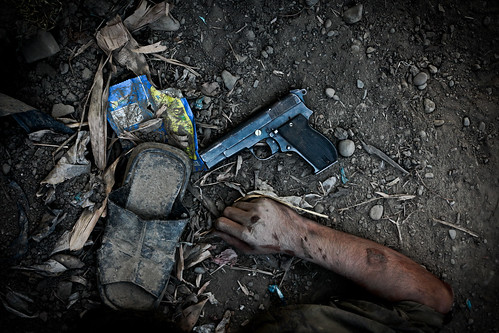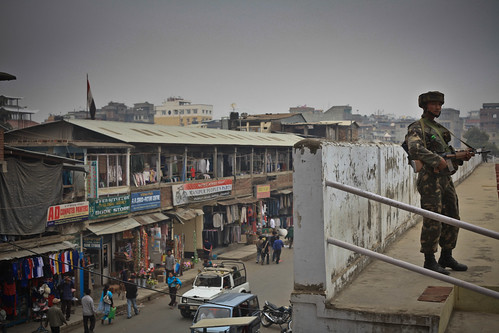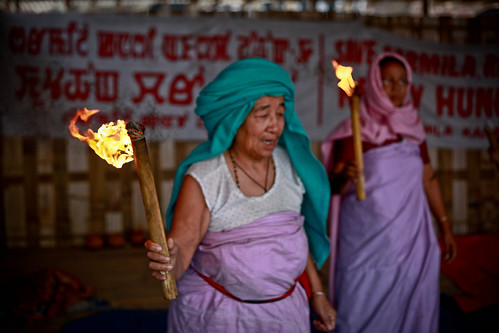 I
In the heat of day, all is silent in Imphal, except for the soldiers beating their sticks against the hard pavement and the dogs barking in distant neighborhoods. I had arrived a few hours earlier, unaware of the city’s uncertain state of siege, traveling past alternating police checkpoints and local highway blockades. At the series of police checkpoints my belongings were scrutinized, papers examined, and bribes paid. The local blockades were manned by angry Meithei women and children pulling on makeshift rope past burning rubber tires, as much forms of extortion as they were forms of popular protest. The bundle of ten rupee notes in my pocket helped me negotiate these barriers with more ease then most.Manipur was in a state of clampdown, the consequence of the kidnapping and brutal murder of a young dedicated officer of the Manipur Civil Service, Dr. Thingnam Kishan. His body was found along with his driver and guard, hacked to death, strewn under a bridge on one of the state’s highways on February 13. Yet another death in the face of the terror Manipur faces from the armed forces and from scores of militant groups, hardly any of it is reported except by their local media.
The insurgents have been in the region in one from or another since the birth of the country. Manipur is engulfed in a civil conflict with an almost unending stamina for death. The only difference being that more groups have mushroomed, crystallizing around the different ethnic and tribal identities. Each of these groups has their own skewed separatist agenda. What they share is a deep distrust of Indian soldiers and a love for extortion. India has pumped in almost 55,000 soldiers and loads of money in this more than half-century of conflict but neither seems to have staunched political grievances or every day misery.

I walk over to the window and took pictures of the scene beyond the heavy grill. The suspicious black box in my possession catches the eyes of one of the soldiers, in a sudden jerk he dismounts his gun off this shoulder and points its upwards; I drop my camera and protrude my hands through the metal outwards to make my intentions clearer – my first exchange of fear.
If you have lived in Imphal long enough you will find that the life of its 3 lakh inhabitants revolves around perennial cycles of general strikes and curfew. In fact Imphal and many parts of this north east corner of India have remained in a permanent state of partial curfew for decades, a reality incomprehensible to those of us who live in metropolitan India.

Between 5am to 5pm, the city swings into action. Everyone is desperately trying to get a share of the cash, before it runs out. Even the most routine of transactions like buying vegetables or sugar takes on an air of siege. Come evening the streets fill with people making a hasty retreat home - as the last of Imphal throng outside ATMs before the shopkeepers down their shutters and police loudspeakers announce the coming of yet another curfew.
A large photograph of a young woman - her nose covered by a medical swatch making way for a IV tube, stoic and dogged, her eyes peer down at you – dominates a makeshift bamboo hut in New Checkon in Imphal East. This is a picture of Irom Sharmila, she has not eaten for nearly 9 years now – for this she has been locked up by government and force-fed by tubes. She launched into this almost decade long fast unto death, demanding the removal of the repressive Armed Forces Special Powers Act(AFSPA) after she witnessed the killing of 10 innocent civilians allegedly at the hands the Assam Rifles in November of 2000. Their killings like many others Manipur has witnessed came under the aegis of a law that gives the Indian army extraordinary powers to quash ethnic insurgencies. In the hut Ima K Taruni and the dozen other Meira Paibi, the torch bearers are angry as they sit in a relay hunger strike for Sharmila. “Enough is enough, we will not vote until AFSPA is revoked. What kind of democracy is this were members of our own army kill us with impunity.”

The smog gently floats over the valley in a vacuum left by the pause of violence; in the days that follow it is the Yaoshang festival. A quiet before the storm only to be pierced by gun fire. In the streets people scatter, shop shutters come rumbling down and all is once more quiet in anticipation of the next rattle of bullets. A photographer’s job is filled with fool’s errands; we chase gunfire instead of escaping it. Meters away in Imphal’s Kunjabi lekhai I find them breathing their last-two young men murdered and branded as insurgents in yet another encounter. A 9mm pistol, a grenade and some documents enough proof. People watch as their bodies are propped and put onto the back of a pickup truck by a lanky policeman. In Manipur death itself has become a spectacle.
 In the heat of day, all is silent in Imphal, except for the soldiers beating their sticks against the hard pavement and the dogs barking in distant neighborhoods. I had arrived a few hours earlier, unaware of the city’s uncertain state of siege, traveling past alternating police checkpoints and local highway blockades. At the series of police checkpoints my belongings were scrutinized, papers examined, and bribes paid. The local blockades were manned by angry Meithei women and children pulling on makeshift rope past burning rubber tires, as much forms of extortion as they were forms of popular protest. The bundle of ten rupee notes in my pocket helped me negotiate these barriers with more ease then most.Manipur was in a state of clampdown, the consequence of the kidnapping and brutal murder of a young dedicated officer of the Manipur Civil Service, Dr. Thingnam Kishan. His body was found along with his driver and guard, hacked to death, strewn under a bridge on one of the state’s highways on February 13. Yet another death in the face of the terror Manipur faces from the armed forces and from scores of militant groups, hardly any of it is reported except by their local media.
The insurgents have been in the region in one from or another since the birth of the country. Manipur is engulfed in a civil conflict with an almost unending stamina for death. The only difference being that more groups have mushroomed, crystallizing around the different ethnic and tribal identities. Each of these groups has their own skewed separatist agenda. What they share is a deep distrust of Indian soldiers and a love for extortion. India has pumped in almost 55,000 soldiers and loads of money in this more than half-century of conflict but neither seems to have staunched political grievances or every day misery.
In the heat of day, all is silent in Imphal, except for the soldiers beating their sticks against the hard pavement and the dogs barking in distant neighborhoods. I had arrived a few hours earlier, unaware of the city’s uncertain state of siege, traveling past alternating police checkpoints and local highway blockades. At the series of police checkpoints my belongings were scrutinized, papers examined, and bribes paid. The local blockades were manned by angry Meithei women and children pulling on makeshift rope past burning rubber tires, as much forms of extortion as they were forms of popular protest. The bundle of ten rupee notes in my pocket helped me negotiate these barriers with more ease then most.Manipur was in a state of clampdown, the consequence of the kidnapping and brutal murder of a young dedicated officer of the Manipur Civil Service, Dr. Thingnam Kishan. His body was found along with his driver and guard, hacked to death, strewn under a bridge on one of the state’s highways on February 13. Yet another death in the face of the terror Manipur faces from the armed forces and from scores of militant groups, hardly any of it is reported except by their local media.
The insurgents have been in the region in one from or another since the birth of the country. Manipur is engulfed in a civil conflict with an almost unending stamina for death. The only difference being that more groups have mushroomed, crystallizing around the different ethnic and tribal identities. Each of these groups has their own skewed separatist agenda. What they share is a deep distrust of Indian soldiers and a love for extortion. India has pumped in almost 55,000 soldiers and loads of money in this more than half-century of conflict but neither seems to have staunched political grievances or every day misery. I walk over to the window and took pictures of the scene beyond the heavy grill. The suspicious black box in my possession catches the eyes of one of the soldiers, in a sudden jerk he dismounts his gun off this shoulder and points its upwards; I drop my camera and protrude my hands through the metal outwards to make my intentions clearer – my first exchange of fear.
If you have lived in Imphal long enough you will find that the life of its 3 lakh inhabitants revolves around perennial cycles of general strikes and curfew. In fact Imphal and many parts of this north east corner of India have remained in a permanent state of partial curfew for decades, a reality incomprehensible to those of us who live in metropolitan India.
I walk over to the window and took pictures of the scene beyond the heavy grill. The suspicious black box in my possession catches the eyes of one of the soldiers, in a sudden jerk he dismounts his gun off this shoulder and points its upwards; I drop my camera and protrude my hands through the metal outwards to make my intentions clearer – my first exchange of fear.
If you have lived in Imphal long enough you will find that the life of its 3 lakh inhabitants revolves around perennial cycles of general strikes and curfew. In fact Imphal and many parts of this north east corner of India have remained in a permanent state of partial curfew for decades, a reality incomprehensible to those of us who live in metropolitan India. Between 5am to 5pm, the city swings into action. Everyone is desperately trying to get a share of the cash, before it runs out. Even the most routine of transactions like buying vegetables or sugar takes on an air of siege. Come evening the streets fill with people making a hasty retreat home - as the last of Imphal throng outside ATMs before the shopkeepers down their shutters and police loudspeakers announce the coming of yet another curfew.
A large photograph of a young woman - her nose covered by a medical swatch making way for a IV tube, stoic and dogged, her eyes peer down at you – dominates a makeshift bamboo hut in New Checkon in Imphal East. This is a picture of Irom Sharmila, she has not eaten for nearly 9 years now – for this she has been locked up by government and force-fed by tubes. She launched into this almost decade long fast unto death, demanding the removal of the repressive Armed Forces Special Powers Act(AFSPA) after she witnessed the killing of 10 innocent civilians allegedly at the hands the Assam Rifles in November of 2000. Their killings like many others Manipur has witnessed came under the aegis of a law that gives the Indian army extraordinary powers to quash ethnic insurgencies. In the hut Ima K Taruni and the dozen other Meira Paibi, the torch bearers are angry as they sit in a relay hunger strike for Sharmila. “Enough is enough, we will not vote until AFSPA is revoked. What kind of democracy is this were members of our own army kill us with impunity.”
Between 5am to 5pm, the city swings into action. Everyone is desperately trying to get a share of the cash, before it runs out. Even the most routine of transactions like buying vegetables or sugar takes on an air of siege. Come evening the streets fill with people making a hasty retreat home - as the last of Imphal throng outside ATMs before the shopkeepers down their shutters and police loudspeakers announce the coming of yet another curfew.
A large photograph of a young woman - her nose covered by a medical swatch making way for a IV tube, stoic and dogged, her eyes peer down at you – dominates a makeshift bamboo hut in New Checkon in Imphal East. This is a picture of Irom Sharmila, she has not eaten for nearly 9 years now – for this she has been locked up by government and force-fed by tubes. She launched into this almost decade long fast unto death, demanding the removal of the repressive Armed Forces Special Powers Act(AFSPA) after she witnessed the killing of 10 innocent civilians allegedly at the hands the Assam Rifles in November of 2000. Their killings like many others Manipur has witnessed came under the aegis of a law that gives the Indian army extraordinary powers to quash ethnic insurgencies. In the hut Ima K Taruni and the dozen other Meira Paibi, the torch bearers are angry as they sit in a relay hunger strike for Sharmila. “Enough is enough, we will not vote until AFSPA is revoked. What kind of democracy is this were members of our own army kill us with impunity.” The smog gently floats over the valley in a vacuum left by the pause of violence; in the days that follow it is the Yaoshang festival. A quiet before the storm only to be pierced by gun fire. In the streets people scatter, shop shutters come rumbling down and all is once more quiet in anticipation of the next rattle of bullets. A photographer’s job is filled with fool’s errands; we chase gunfire instead of escaping it. Meters away in Imphal’s Kunjabi lekhai I find them breathing their last-two young men murdered and branded as insurgents in yet another encounter. A 9mm pistol, a grenade and some documents enough proof. People watch as their bodies are propped and put onto the back of a pickup truck by a lanky policeman. In Manipur death itself has become a spectacle.
The smog gently floats over the valley in a vacuum left by the pause of violence; in the days that follow it is the Yaoshang festival. A quiet before the storm only to be pierced by gun fire. In the streets people scatter, shop shutters come rumbling down and all is once more quiet in anticipation of the next rattle of bullets. A photographer’s job is filled with fool’s errands; we chase gunfire instead of escaping it. Meters away in Imphal’s Kunjabi lekhai I find them breathing their last-two young men murdered and branded as insurgents in yet another encounter. A 9mm pistol, a grenade and some documents enough proof. People watch as their bodies are propped and put onto the back of a pickup truck by a lanky policeman. In Manipur death itself has become a spectacle.
0 comments:
Post a Comment